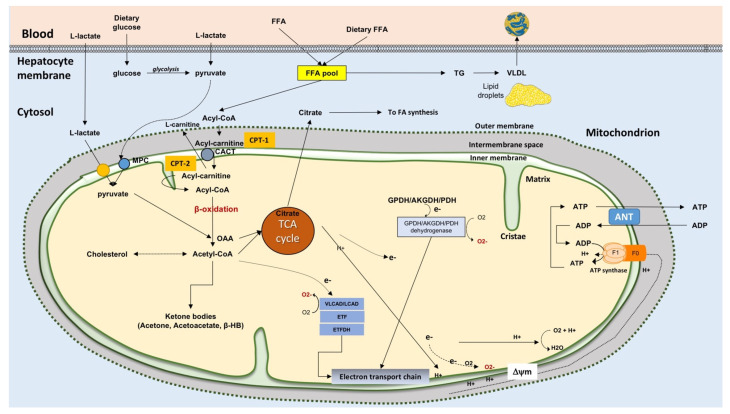Figure 2.
Mitochondrial adaptation and oxidative stress in NAFLD. Mitochondrial oxidative metabolism and hepatocyte energy homeostasis depend on FFA β-oxidation, the tricarboxylic acid cycle (TCA), electron flow along the electron transport chain, electrochemical proton gradient generation, and ATP synthesis. When β-oxidation is impaired (e.g., in liver steatosis), lipotoxic lipids accumulate. Moreover, dysfunction of the electron transfer chain can result in ROS generation. ROS are generated from glycerol 3-phosphate dehydrogenase (GPDH), pyruvate dehydrogenase (PDH), and α-ketoglutarate dehydrogenase (AKGDH) as minor contributors. In starvation, ketone bodies are produced due to the absence of oxaloacetate used in gluconeogenesis. Dietary carbohydrates and dietary FFA are the two major sources contributing to the FFA pool in the hepatocyte. When fatty acid synthesis occurs, glucose essentially from dietary sources is converted to pyruvate during glycolysis. Pyruvate can enter the mitochondrion via the mitochondrial pyruvate carrier (MPC) as well as can be synthesized from L-lactate after transport of L-Lactate in the matrix, via its own carrier, and oxidation via the mitochondrial L-lactate dehydrogenase [35,36]. In the matrix, pyruvate can provide Acetyl-CoA via the pyruvate dehydrogenase complex and oxaloacetate (OAA) via the pyruvate carboxylase. Due to citrate synthase, pyruvate and oxaloacetate provide citrate that can be exported to allow for FFA synthesis in the cytoplasm in the de novo lipogenesis (DNL). How citrate can be exported outside mitochondria is described below. Abbreviations: ACC, acetyl-CoA carboxylase (ACC); ANT, adenine nucleotide translocator; CACT, carnitine-Acylcarnitine Transferase; CPT-1, carnitine palmitoyl-transferase-1; CPT-2, carnitine palmitoyl-transferase-2; DNL, de novo lipogenesis; electron transfer flavoprotein (ETF); ETFDH, ETF dehydrogenase; FFA, free fatty acids; β-HB, β-hydroxybutyrate; MPC, mitochondrial pyruvate carrier; OAA, oxaloacetate; PEP, phosphoenolpyruvate; TG, triglycerides; VLDL, very-low-density lipoprotein [37].

